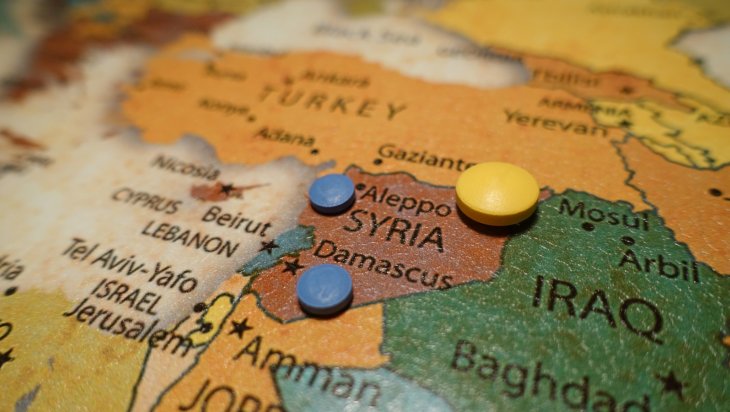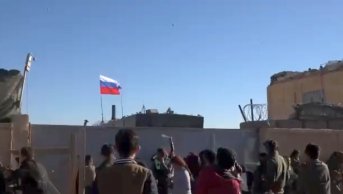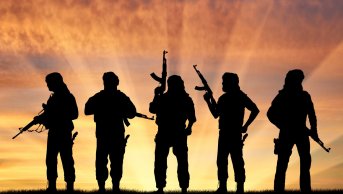Background of PYD-KNC Union Meetings in Syria

PYD spokesperson Sema Begdaş announced on January 17th that the union meetings of the PYD- Kurdish National Council in Syria (KNC) will resume in February 2021. Two days after Begdaş announced that the negotiations for the Kurdish unity would continue with determination, an armed attack was carried out on the KNC office in Ayn al-Arab. On 13-15 January, attacks were carried out, this time against KNC offices in Al-Darbasiyah and Amuda. In the statements made by the PYD regarding the events, it was stated that the attacks were carried out by people who did not want the union to meet. However, it is possible to evaluate the attacks as a reflection of the tension between the Kurdish Regional Government (KRG) of Iraq and the PKK in the northeast of Syria. With the tension in Iraq, the YPG set fire to KNC party buildings in the region and attempted to arrest KNC members. In line with all these developments leading up to the conflict between the parties, it is possible to express that the unity efforts have taken a serious blow. With the latest events, it will take time for the conditions that will enable the KNC to sit at the table with the PYD again. In this process, despite the moderate statements of the PYD / YPG, it is highly likely that, in practice, it will continue its repressive policy, which includes attacks and arrests against the KNC. The negotiation process, which started in April 2020 with the initiatives of the USA, was declared stopped as of November 2020 and the parties made different claims about the reasons for this. In the negotiations of the KNC delegation with the KRG, it was reported that the negotiations failed, the USA, which was the arbiter, took sides and the PYD refrained from taking responsibility. Meanwhile the PYD stated that the process did not progress due to the demands of the KNC upon the agenda. The accusing statements of the parties were later replaced by the statements that "the negotiations were stopped due to the election process in the USA and the USA will resume from where it left off after the determination of the new delegation to take part in the negotiations." The negotiations were mostly blocked due to issues such as the sharing of the administration, the education system, compulsory military service, the status of the arrested KNC members, and the return of the Roj Peshmerga to the region. However, the PYD is trying to leave an open door for new meetings along with claiming that the meetings were stopped due to the US election process. The main factor underlying the changing attitude is the warning for "avoiding statements that could harm the negotiations" made to the parties from the USA.
The PYD's insistence on announcing a final agreement with the KNC in the shadow of tensions in the field is an effort to legitimize the structure established. In the Syrian Constitutional Committee established on September 23, 2019, 2 KNC members are representing the Syrian Kurds. In the committee, which consists of 150 people in total, no PYD member was included in the list. Following this development, the PYD declared that "countries such as the USA, Russia, France, and the UK should support them to take part in the constitutional work to represent the Kurds in Syria." The formula found in terms of participation of the PYD in political negotiations was a merger with KNC under the roof of "national unity". In this context, 25 Kurdish political parties, including the PYD, announced the establishment of a new umbrella organization after the meeting held in Qamishli on 18 May 2020. The signed parties in the statement are as follows: Kurdistan Democratic Peace Party, Democratic Union Party (PYD), Kurdistan Democratic Party of Syria (KDP-S), Green Party of Kurdistan, Kongreya Star, Kurdistan Democratic Party of Syria, Left Party of Syrian Kurds, Kurdistan Liberal Union Party, Kurdistan Brotherhood Party (PBK), Syrian Kurdish National Party, Kurdistan Democratic Change Party, Kurdistan Democratic Party of Struggle, Syrian Kurdistan Reform Movement, Kurdish Freedom Party, Syrian Kurdish Democratic Party. The umbrella structure formed by the PYD and the parties acting with it was called the "Kurdish National Unity Parties" (PYNK). The purpose of its establishment was stated as “ensuring unity between political movements, especially the Kurds.” To give a pluralistic image, the structure was created by bringing together several independent parties that have no activity in the field and was essentially formed by the coming together of the PYD and its supporting parties. In the background of taking this step is the effort to participate in the Constitutional Committee meetings by camouflaging the PYD. The statement confirming this assumption was made by Sema Begdaş, a member of the PYNK Negotiation Committee. Begdaş stated that "PYNK will act together in all national and international negotiations and include its representatives in the negotiations." Since the second phase of negotiations in August 2020, there has been no longer the PYD directly against the KNC, there has been a seven-person delegation from the new umbrella organization PYNK, the main backbone of the organization.
Two elections will occupy the Syrian agenda in 2021, and the legitimacy of both elections is controversial. The first of these is the 2021 Syrian Presidential election, whose results were announced as being unrecognized by the international public. The second is the local elections to be held in regions controlled by the PYD / YPG to create an alternative to the regime at a regional level. The main purpose of both sides here is to gain legitimacy and to impose their achievements on international public opinion. The statement of Mazlum Kobani, the head of the YPG / SDF that the goals for 2021 are "to hold elections and to strengthen local government staff" also supports the ultimate aim.
Local elections to be held in the YPG region have been one of the main disagreements between the PYNK and the KNC. The KRG Representative of the KNC, Abdul Karim Morani, announced that "they are not against the elections to be held in northern Syria, but they will not participate in the elections without an agreement with the PYNK." Stating that the current situation in the region is not suitable for the elections, Morani said, “If there will be an election, it should be under the supervision of the UN and European countries. During the year, the primary goal is not the realization of elections, but the announcement of a final agreement between the parties.” In areas with a dense Arab population, to hold an election with the PYNK is not desired. Referring to this situation in his statement, Morani stated that "It is not right to impose elections on the regions where Arabs are concentrated, and in this case, new conflicts between the parties may begin." In the union meetings initiated by the US in April 2020, the parties decided to hold local elections in the region as part of the agreement and that the KNC should also be actively involved in the political process of the region. The KNC wanted to take part in local governments by appointment rather than waiting until the elections, and the PYNK stipulated that the KNC should take part in the administration depending on the vote to be taken in the elections. The political activities of the KNC, which has not been in the region for a long time, are restricted by the PYD. In this case, if the KNC participates in these illegitimate elections, it is unlikely to take part in the administration. The PYD wants to eliminate the obstacle to holding elections in regions where the Arab population is predominant, with a final agreement to be announced with the KNC. It is very difficult to talk about a common ground that will unite the Syrian Kurds and share the so-called administration.
On the other hand, the YPG does not want any other armed structure other than itself in the region and prevents the "Roj Peshmerga," which is the military branch of the KNC and deployed in Northern Iraq, from entering the Syrian field. The YPG / PKK opposed the effort to establish a partnership with the KNC when it was strong and did not allow KNC member parties to operate in Syria. However, changing conditions pushed the YPG to cooperate with the KNC and it was seen that the KNC responded positively to this offer from the YPG. As the most concrete example of this, it can be shown that the YPG invited Roj Peshmergas to the region in the attacks of ISIS against Ayn al-Arab in September 2014. The role of the USA in this rapprochement is quite big. During a visit to the KRG region on 10 October 2014, Antony Blinken, who was the US Deputy National Security Advisor, and Brett McGurk, who served as the U.S. Special Representative for combating ISIS asked for the unity of the Kurds. As a result of these negotiations, the TEV-DEM which is the umbrella structure of the KNC and YPG / PYD in Syria signed the Duhok Agreement on 22 October 2014. In the agreement consisting of 3 main articles, the issues of "joint administration, joint military power, and political unity" were discussed. It was decided to establish a joint delegation to jointly manage the cantons and to unite the military forces. However, the parties could not reach a full consensus on the selection of the members. Although the Roj Peshmerga were allowed to enter the region under the Duhok Agreement, the YPG prevented this, and small groups entering the region were arrested. The YPG asked the peshmergas to leave the region after the removal of the ISIS threat towards Ayn al-Arab. The parties continued to blame each other for not fully complying with the agreements reached. Turkey, on October 9, 2019, launched the Peace Operation Spring for reasons such as ensuring border security and the return of refugees when the “safe zone” plan, which Turkey was trying to solve by using diplomatic channels, was not clear. The YPG, which suffered a great loss of power after this operation, brought back the move it had used before. The YPG, which is trying to open a space for itself by seeking a temporary alliance, announced that they are ready to act together with other Kurdish actors under the name of "national unity". In general, from the point of view of the PYD/YPG, it can be said that these cooperation units are considered to be a temporary measure and the PYD/YPG can be expected to return to the policy of pressure in any case whenever it is believed that there is no need for cooperation.
The transition of the Roj Peshmerga to the northeast of Syria has been an issue that the parties agreed on paper from time to time during the negotiation process but could not put it into action. A recent statement by Aldar Khalil of the PYD has ignited the debate again. Khalil's statement that "the Roj Peshmerga are just a gang and it is not possible to carry out a military duty in the region" was criticized harshly by KNC and demanded that Khalil be removed from the union talks on the grounds that it harmed the dialogue between the Kurdish parties. The fact that the general attitude of the PYD / YPG towards the Roj Peshmerga will not change with the dismissal of a person from the negotiating team is a situation that the KNC is also aware of.
Wishing to declare the final agreement as soon as possible, the PYD positioned itself in a higher status than the KNC in the negotiations. The main purpose of the PYD, which initiated the negotiation process with the calls for unity, is not to "create unity" but to "gain legitimacy in search of unity." For this reason, the different parties have tried to ignore the existing problems and different attitudes between the parties. Important issues such as the fate of the KNC members detained by the PYD, the demand of the PYD to completely break its ties with the PKK, the different attitudes towards the Syrian regime and the return of the Peshmerga forces to the region were the main points of disagreement between the parties from the past and came to the fore again during the negotiation process. It is known that the SDF / YPG developed pragmatic relations with other Kurdish actors and the al-Assad regime during the periods when they lost power in northern Syria. The KNC has consistently condemned the YPG's continuing relationship with the regime. This situation was brought up in the negotiations as a request of the KNC, but it was not accepted by the YPG. Although there is a consensus between the parties that the so-called autonomous regions should be based on joint management, it is not clear yet how this will happen. The KNC demanded that the return of the Peshmerga forces to the region be under the supervision of international and regional powers and then the preservation of their presence in the region by these forces. The distrust towards YPG forces can be seen clearly here.
It is not possible for a union to be permanent without a lasting "common" goal for the future and maintained under the pressure of external actors. Almost seven years have passed since the process that started with the Duhok Agreement signed between the parties in 2014 and the conditions in the field have changed in this process. Today the presence of the Russian and the Syrian regime is also the subject as well as Turkey and the United States to the east of the Euphrates. Different options have been activated in the face of Turkey’s clear attitude to the construction of terrorism in the region. The YPG has recently entered into a power struggle in Ayn Issa with the Russian-Syrian regime with which it has entered a temporary alliance when necessary. It has been observed that the scope of the struggle has expanded and this move paid off for the YPG in Al-Hasakah and Qamishli. The YPG, which besieged the military areas known as the "Security Square" belonging to the Assad regime, demanded that the regime forces be withdrawn from there. Under the control of Russia, negotiations began between the YPG / PKK and the al-Assad regime forces. In these meetings, the YPG / PKK insisted on the withdrawal of regime forces from Al-Hasakah province; If the al-Assad regime did not withdraw, the YPG threatened to use force. The fact that the USA did not prefer to be directly involved with the YPG in this process due to the tension in the KRG region left the YPG on its own. As the developments in the field did not go as intended, the YPG is trying to find a way out by focusing on the unfinished negotiations with the KNC. However, it can be said that it will be difficult to completely solve the deep-rooted problems between the parties with an external intervention.







